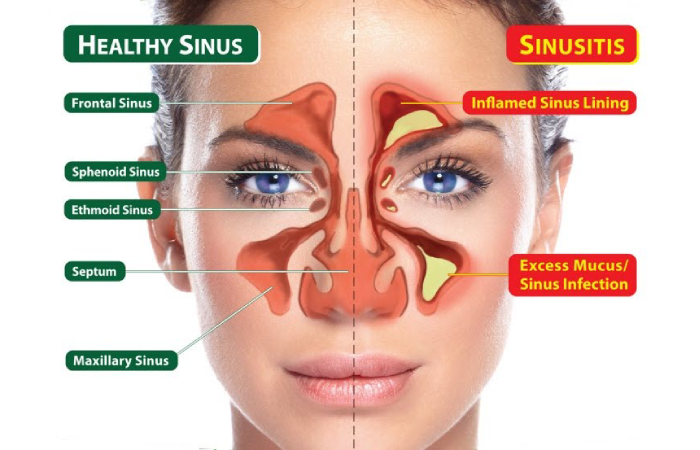Sinus Infection Definition
Nasal congestion that won’t get better? You could have a sinus infection, also called a sinus infection.
Some skin infections, such as cellulitis, need treatment with antibiotics, but others will get better on their own without antibiotics.
Your doctor can determine if you need an antibiotic.
What are the Causes of a Sinus infection?
Sinus Infection occurs when fluid builds up in the air-filled cavities of the face (sinuses), allowing germs to multiply.
Viruses cause most Sinusitis, but bacteria can cause some.
What are the Risk factor’s?
What are the Several factors can increase your risk of Sinusitis:
- A previous cold
- Seasonal allergies
- Smoking and exposure to secondhand smoke
- Structural problems within the sinuses (such as growths in the lining of the nose or paranasal sinuses, known as nasal polyps)
- Having a weakened immune system or taking medications that weaken it
What are the Symptoms of sinus?
Common symptoms of Sinusitis include:
- Seasonal allergies
- Colds
- Runny nose
- Nasal congestion
- Pain or pressure in the face
- Headache
- Mucus drip in the throat (postnasal drip)
- Sore throat
- Cough
- Bad breath
When to seek medical attention?
See a doctor if you have:
- Symptoms that get worse after initially improving.
- Symptoms that last more than ten days and do not improve.
- Shivering that lasts more than 3 to 4 days.
- You should always seek medical attention if you have had complicated Sinusitis in the past year.
- See a doctor right away if your child is less than three months old and has a fever of 100.4 ° F (38 ° C) or higher.
- This list is not all-inclusive. See a doctor if any symptoms are severe or concerning.
What is the Treatment?

- And also, your doctor will determine if you have Sinusitis by asking questions about your symptoms and doing a physical exam.
- In many Sinusitis, antibiotics are not necessary.
- And also, most sinus infections usually get cured on their own without antibiotics.
- Antibiotics won’t help you if you don’t need them, and the side effects could even harm you.
- Side effects can range from minor problems, such as a rash, to severe health problems, such as antibiotic-resistant infections and C. diff infection.
- Which causes diarrhea that can extremely injure and lead to death.
- However, in some cases, antibiotics healing needed. Talk to your doctor about the best treatment for your disease.
- What is handling with antibiotics, and what is not an image icon?
- For some sinusitis, your doctor might recommend watchful waiting or delayed antibiotic prescribing.
Watchful waiting
And also, tour child’s doctor may suggest being vigilant and waiting to determine if your child needs antibiotics.
It gives the immune system time to fight the infection.
And also, if your child does not feel better after 2-3 days of rest, more fluids, and pain relievers, the doctor may prescribe an antibiotic.
Delayed Prescription
Your child’s doctor may give you a prescription for antibiotics but may suggest waiting 2 or 3 days before buying to see if your child is still sick.
What to do to feel better in sinus?
- And also, if you are considering using a sinus rinse, visit Sinus Rinse for Health or Religious Reasons to find out how to do it safely.
- Here are some ways you can help relieve sinus pain and pressure:
- Put a warm compress on your nose and forehead to help relieve pressure on your sinuses.
- Use a decongestant or nasal saline spray.
- Inhale steam from a bowl of hot water or the shower.
- Ask your doctor or pharmacist about the counter medicines that helps you to feel good. Always use over-the-counter medications as directed.
Over-the-counter medicines and children
Be careful when giving over-the-counter medicines to children.
Not all OTC medications are recommending for children of certain ages.
Medicines to relieve pain
- Children under six months of age: give only acetaminophen.
- Children 6 months of age and older: It is okay to give acetaminophen or ibuprofen.
- And also, Never give aspirin to children because it can cause Reye’s syndrome, a rare but severe disease that damages the liver and brain.
Cough and cold medicines:
- Children under four years of age: Do not use unless specifically directed by a doctor.
- Be sure to ask your doctor or pharmacist about the proper dosage of over-the-counter medications for your child’s age and size.
- Using over-the-counter cough and cold medications in young children can have severe and life-threatening side effects.
- Children 4 years of age and older: Talk with your child’s doctor to determine if it is safe to give over-the-counter cough and cold medicine to relieve symptoms temporarily.
- And Also, tell your child’s doctor and pharmacist about any prescription or over-the-counter medicine your child is taking.
What are the Prevention of sinus?
You can help prevent Sinusitis by doing everything you can to stay healthy and keep others healthy.
It includes:
- Clean your hands.
- Get recommended vaccinations, such as the flu shot and the pneumococcal vaccine.
- And also, avoid contact with people who have cold or other respiratory infections.
- Don’t smoke and avoid secondhand smoke.
- And Also, Use a clean humidifier to moisten the air in your home.
Also Read: Which Skirt and Dress length suits You? – Mini, Midi, or Maxi
READ MORE:- techbloggerit